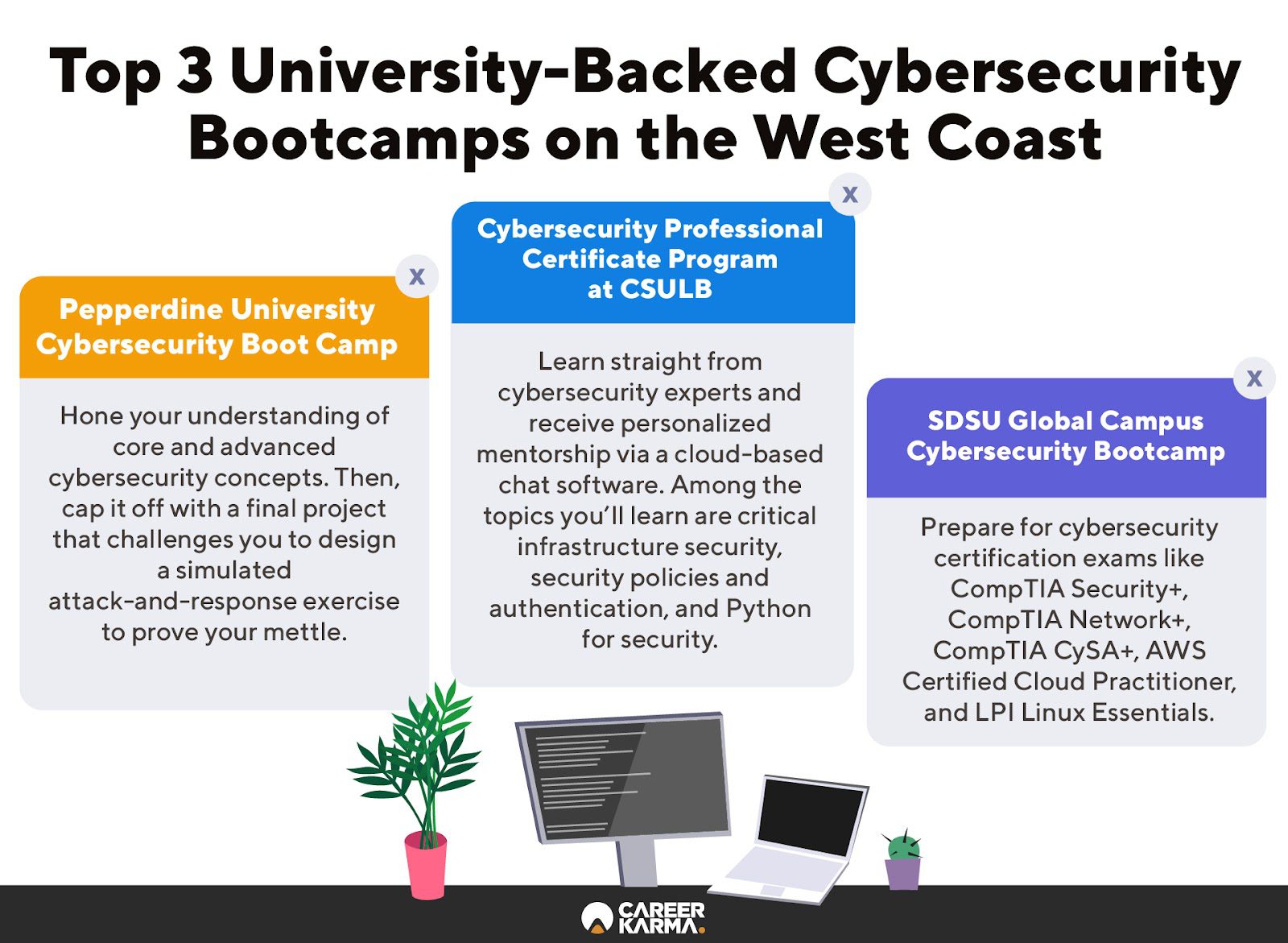The West Coast economy is growing almost twice as much as the rest of the US. Contributing to this is the presence of leading tech companies in the region, which has helped spark widespread digital disruption across industries. This is good news, but one that comes with challenges, as cyber attacks on every major organization continue, from health to education to major corporations.
The never-ending cyber threats are prompting companies to increase cybersecurity expenditure in 2022 and beef up their team of cyber pros. For instance, recent data from Cyberseek reveals that there are over 63,000 cybersecurity job vacancies in California at the time of publishing. This makes it the state with the second-highest demand for cybersecurity professionals, next only to Texas. This presents vast opportunities for aspiring tech workers.
If you’re a career starter or a career switcher looking to break into cybersecurity, here’s a guide on how to hack your way into this burgeoning sector.
Why Become a Cybersecurity Analyst?

- It can be fulfilling. Cybersecurity analysts spend their day-to-day monitoring IT infrastructure and detecting intrusions that threaten the privacy of millions of cyber users. In other words, they help make the cyber world a better and safer place.
- It pays well, even at entry-level. According to PayScale, entry-level jobs for cybersecurity analysts pay around $65,000, which is already higher than the US national average salary of $52,000. As you gain more experience and certifications, you can earn up to $116,000 per year.
- It presents tons of career growth opportunities. The growth opportunities in this field seem boundless. Several factors contribute to this, including the increasing number of businesses moving to the Cloud. On their heels are the growing number of cybercriminals looking to breach their IT infrastructure and compromise data.
- It is a possible career move, even without a degree. Even though cybersecurity analysts are among the top paid tech professionals, you don’t need a college degree to become one. In fact, you can become a cybersecurity analyst in less than a year through a cybersecurity bootcamp.
3 University-Backed Cybersecurity Bootcamps on the West Coast

With thousands of job openings on the West Coast’s cybersecurity market, here’s a list of the top cybersecurity bootcamps that can equip you with the advanced skills you need to defend the region from malicious online actors.
Each bootcamp splits into two phases: the Introductory Course (30 hours) and the Extended Program (370 hours). The Introductory Course will walk you through the fundamentals of cybersecurity, which is a great way to ease you into the field, especially if you’re a beginner. It also allows you to assess whether you want to continue your training in the Extended Program, which will explore the advanced aspects of cybersecurity.
Pepperdine University Cybersecurity Boot Camp
What will you learn from this program? Pepperdine University’s Cybersecurity Boot Camp equips you with the necessary skills to prepare for a cybersecurity job in less than a year. Below are examples of skills you’ll learn at the boot camp:
- Computer networking. Learn how computing devices are linked together to create a network. This is also one of the areas covered in the CompTIA Network+ exam.
- Linux and Microsoft security. Learn how to install, configure, and defend two of the most used operating systems among companies worldwide: Linux and Windows. Topics include utilizing disk management tools and file system error handling.
- Cloud security. Explore the security challenges inside top cloud service platforms like Amazon Web Services (AWS), Microsoft Azure, and Google Cloud.
The program culminates in a final project that will challenge you to design an attack-and-response exercise, testing your skills in handling real-world cyber threats. It also serves as a great addition to your portfolio.
California State University, Long Beach Cybersecurity Professional Certificate Program
What will you learn from this program? The Cybersecurity Professional Certificate Program offered by the College of Professional and International Education at CSULB is packed with practical projects to equip you with skills that include the following:
- Critical infrastructure security. Learn how to defend critical infrastructure or assets and networks vital in maintaining societal functions. These include power plants, telecommunications networks, and transportation services.
- Security policies and authentication. Nearly every page, app, or platform we access online requires user accounts. Through this bootcamp, you’ll learn about the best practices of authorization and authentication and how to keep user credentials secure.
- Python for security. Learn how to code in Python, a handy programming language used in malware analysis, penetration testing, and wireless network scanning.
At CSULB, you will receive training from cybersecurity professionals with years of industry experience. To help you fortify newly-acquired knowledge and hone your craft, you will be exposed to simulations of real-world attacks on a virtual training platform.
SDSU Global Campus Cybersecurity Bootcamp
What will you learn from this program? San Diego State University’s Global Campus is home to dozens of online degree programs and certificate courses in various fields. Its online Cybersecurity Bootcamp covers skills you’ll need to prepare for certification exams like CompTIA Security+, CompTIA Network+, CompTIA CySA+, AWS Certified Cloud Practitioner, and LPI Linux Essentials.
These skills include the following:
- Practical cryptography. Learn how to encrypt messages to protect data from unauthorized users.
- Ethical hacking. Hack into systems and identify potential points for a data breach. By identifying these vulnerabilities, you can strengthen the computer system before it gets exploited by black hat hackers.
- Digital forensics and incident response. Gather forensic evidence and investigate cyber attacks to uncover the full extent of the breach and how to respond accordingly.
This program employs a hands-on learning model, allowing you to test out your technical ability in a safe environment and with the guidance of cyber veterans. By the end of the bootcamp, you should be proficient in crucial offensive and defensive tactics.
Hack Your Way Into a Cybersecurity Career
The digital space is evolving faster than ever, and cybercriminals are exploiting every crack and loophole within this space. If you aspire to solve one of the most challenging problems facing our digital space today and get paid well for it, sign up for any of the cybersecurity bootcamps mentioned above.
About us: Career Karma is a platform designed to help job seekers find, research, and connect with job training programs to advance their careers. Learn about the CK publication.




